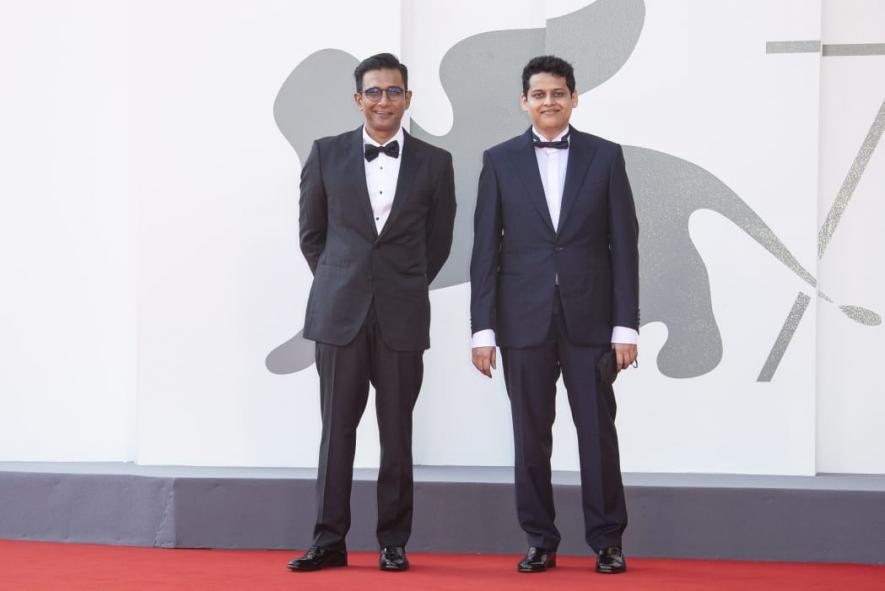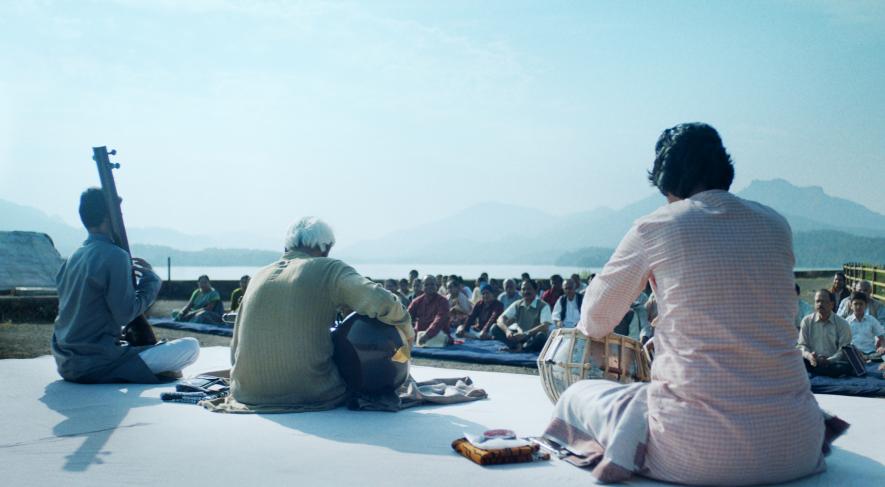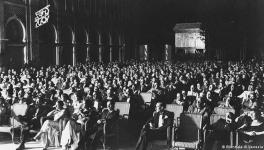‘I Am Wary of Bigger, Commercial Films’—Vivek Gomber

Last week, on winning the Amplify Voices award for The Disciple at the Toronto International Film Festival, writer-filmmaker Chaitanya Tamhane dedicated it to his producer, Vivek Gomber. He said the film, which also won the best screenplay and Fipresci international critics’ awards at the Venice Film Festival in September, would not have been possible without Gomber, “the bravest producer” he has seen. Back in 2014, the Tamhane-Gomber comradeship had created one of the most politically astute contemporary Indian films, Court. A scathing satire on the legal system, it centred on the trial of a protest singer accused of encouraging a manhole worker to suicide.
Their new collaboration, The Disciple, inhabits an entirely different world—Indian classical music. With its screening at the Queens Drive-In theatre in New York on 29 September, it became the first Indian film since Deepa Mehta’s 1996 film, Fire, to make it to the Main Slate of the New York Film Festival.
Gomber spoke to Newsclick on his journey from acting [The President Is Coming, Court, Sir] to independent film production, his close association with Tamhane and his upcoming web series as an actor—Mira Nair’s A Suitable Boy. Excerpts from the conversation:
From trained actor to independent producer. That’s quite an unusual route to take...
Court happened very organically. I learnt [film production] on the job. My training as an actor, especially in theatre, helped me understand how things work structurally and the decorum you need to have, like in leading the team. When you are in theatre you get to do everything. You get to mop the stage and you have to act. I used those skills. The kind of producer I am, or have become, has a lot to do with the roots in theatre.
Theatre is where you met Chaitanya Tamhane and the association started...
The first time I met him, I remember there was a Barista at Prithvi [Theatre] and he was looking for an actor for his play, Grey Elephant in Denmark. I read the script, said I’d like to do it and we started rehearsing. He had an office in Sitladevi [Mumbai]. I don’t know how he was able to have an office at 21 but he did. A small place where we would rehearse. In that intimate environment of getting to know each other very early on, in life, we probably got to know each other very well over the years. You are in that basic [rehearsal] room for the craft of it. No one is getting paid a lot of money. There is no glamour. In that process, I understood what kind of a director and person he is; and he understood what kind of an actor and person I am. That formed the basis [of our collaboration].
So it was all about the personal and the professional coming together for the two of you?
The relationship between a producer and a director is quite intimate, I feel. At least in the way we have worked. We are putting in our own money. We are exploring things we want to explore [together]. You have to be ready from the day you read the script—can you see the film, can you see his vision. You can know that about someone if you have put time in a relationship with that person. Sounds like a couple, but, yeah, it is like that. But we are also very professional. Like I know my job and can’t mess up with it and he knows his... We allow each other to breathe and nobody belongs to anybody. It’s a very good collaboration. In Bombay [now Mumbai], in the film industry, in the brutality, it’s nice to have this kind of a relationship.
Having seen you in Court and Sir, I can see a certain alignment in the kind of films you are doing as an actor and the ones you are backing as a producer...
I do take responsibility of the films I want to be a part of. As an actor I am a little more carefree but I have realised that in today’s day and age you have to be very aware of who you are working with and what you are creating. I did A Suitable Boy with Mira [Nair] last year and I did Bombay Begums [both web series]. [Having said that] I don’t intentionally try and make something that is [all about trying to] prove a point. I [just] end up [getting] these kind of projects—that’s how I’d put it.
As an actor would you do a squarely mainstream film? Or would you, as a producer, back a hardcore commercial film or a web series?
Chaitanya would say “never say never” but I don’t see myself producing a mainstream film because once you start taking that angle—commercially viable—the people around you change. You can’t be doing it on your own, you need collaborators. It becomes tricky. Even as an actor I don’t know how comfortable I would be in a set which is so big and if I feel that the status quo is not right or that people are not being treated well.
When people audition me, I ask for the script, I want to know who the director is, and I want to know what the production house is. I have also heard enough stories in the last twelve years to know that people don’t pay you on time. I am already wary of the bigger, commercial spaces.
That game also becomes about what kind of an actor you are. It’s about your brand. Right now I don’t even get auditions for that [kind of film].
Ten years ago, I had done films where I was playing the best friend of someone. The atmosphere on the sets is very different. I don’t want to be there. I want to be in spaces where you are free to enjoy the process [of film-making].
Any film you have seen of late where you thought you would have fit in well?
I haven’t seen much recently apart form The Last Dance and Thappad, which has mainly female actors. But the husband’s role wasn’t bad. That was an interesting topic. [And] It was very much in the commercial space. Newton, Rajkummar [Rao]’s role in it…that was very nice. I’d love to do it. It’s about voting time, government officials. That space I like a lot. It feels real to me. There are things I enjoyed in Masaan also. I appreciate other people’s work but feel there is a reason why they have got it. I can’t do that, maybe. You can’t see the end product and say you’d have wanted to do it. But, yes, Newton jumped out at me for some reason. Pankaj Tripathi and Anjali Patil were also very good in it. It felt like a good room to be in. I think I look for a good room to be in, with someone who can teach me better.
From what is written on paper to what happens on the sets is a different journey. The producer in me can now read that better for the actor in me. I can sense some things which I wouldn’t have, if I had not been a producer.
But do these two roles you play in life—actor and producer—ever come in conflict with each other?
For me, these have been interconnected journeys that have enhanced each job. I have become a better actor now than I was ten years ago because I worked with Chaitanya and other directors, but for also spending time on a film like The Disciple, seeing Chaitanya direct other actors. You are removed from the film, yet you know everything about it. You can read the notes and see how performances are being shaped. It’s about observing and learning. One informs the other; they are never in conflict.
I guess if my banker was in the room, there will always be a conflict—“you are thinking from your actor’s heart than your practical producer’s mind”. If there’s something that’s required for the film, it’s a full discussion: we have to understand what his vision is and why is he making that call. Sometimes, the creator in me is more interested in taking that risk than I would have if I were only a producer. The only conflict is that I am jealous. Like I am jealous that I could not audition for anything in The Disciple.
Chaitanya told me the film takes off from where the play Grey Elephant in Denmark left off. You played the lead there but still couldn’t find a role in The Disciple?
What he means, I think, is that the essence of the dilemmas of the protagonists is very interesting. The Disciple is a very different extension to it. It has evolved a lot. He was 21 when he did the play; he is 32-33 now. It’s a very different Chaitanya and I have seen him change.
There was nothing in the film for me to do. It is set in the world of Indian classical music and the director believes in taking non-professional actors. I know the tools he uses. He leans towards a certain way. I don’t speak Marathi too well and I’d have to speak Marathi in the film. These are extra challenges. I could only make a pouty face and say “what yaar!” and he laughed and I said “cool”.

In the producer’s note for the Venice Film Festival I have stated that this The Disciple is the most important film of my life as a producer. Who knows if I’ll get my money back or not. Maybe I will have to wait 10-15 years [to make the next film].
The reality of getting the money from the box-office, whatever it’s definition is, in this COVID world, all that is distracting and disappointing. Practically, I don’t know if I’d be producing again, if this will be the last one. It was the same with Court. Will we do something like that again? It was a small film we made quietly. Pushing the film, sending it here and there, releasing it in the theatres, all of it takes so much out of you because it becomes so personal. It’s a long journey. You don’t know what you are getting into, but you must love your subject. So, yes, The Disciple is the most important film I have made—that kind of clarity makes the journey easier.
What is the pleasure and pressure in being an indie producer?
I am two films old and learning. I have been collaborating with a director I enjoy working with. Someone who helps understand and express what is happening inside me and what’s happening in Mumbai. I have discussed art and life and love with him over a period of twelve years now.
It feels great to quietly do something and believe in the process and the vision. It’s about backing someone and saying “hey world, notice this guy”. The bigger Chaitanya gets, the more people talk about him and appreciate his journey, the more it makes me happy. I do care whether we get our money back or not but this makes me happier; that people are discovering someone. It feels good that everyone else is seeing the talent that I am seeing. It’s great that I can be a facilitator to that. I like being part of a team where we have created something like a Court or The Disciple.
I have never had a lot of money. When my father passed away he left me some and I have put that into films. I don’t have much money left. I could have had a different life, spent on different things but I wanted to create.
Despite it being a terrible year, The Disciple has made it to all the three top international Fall film festivals—Venice, Toronto and New York...
The way 2020 has turned out, anything that cheers, makes one feel good. It feels like a blessing; the year has put everything in perspective. The Disciple was ready, it wasn’t stuck in post-production, thankfully. We were like if this year is washed out, we will see next year. Then Venice, TIFF and NYFF happened. That felt very big. That gives me hope. I am very positive. In a way, the film is also for a global audience. The story is based in India. It is about Indian heritage and culture and social changes. But it’s about having these conversations with the world. We are hoping that anyone should be able to relate to it.
What was the trajectory that A Suitable Boy took you on, as an actor?
With Mira Nair, I was working with a legend. Salaam Bombay! Monsoon Wedding, The Namesake have been huge films when it comes to Indian cinema. And I have watched her works abroad, all over, in theatres in Singapore, New York. Just to be in the same room with her is amazing. She is such a big personality. The scale of production, how they were handling it were like taking notes for the future. The ensemble was really good. Rasika Dugal, Vivaan Shah, Shahana Goswami, Namit Das. I was shooting scenes with people I had seen in and around Mumbai… Gagan Dev Riar, whom I have seen on-stage, doing Piya Behroopiya. Mira [Nair] cast over a period of time and was able to find these actors. I was very happy that she took me, that she didn’t fire me. I haven’t seen the series yet. I will watch it at one go when it comes on Netflix. I am not very kind to myself when I watch myself on screen. So I just stay away. I have done my work, I have to let go as well.
Get the latest reports & analysis with people's perspective on Protests, movements & deep analytical videos, discussions of the current affairs in your Telegram app. Subscribe to NewsClick's Telegram channel & get Real-Time updates on stories, as they get published on our website.

















